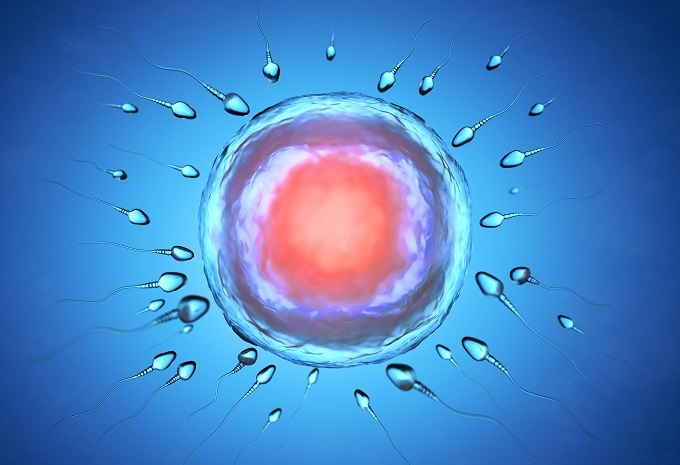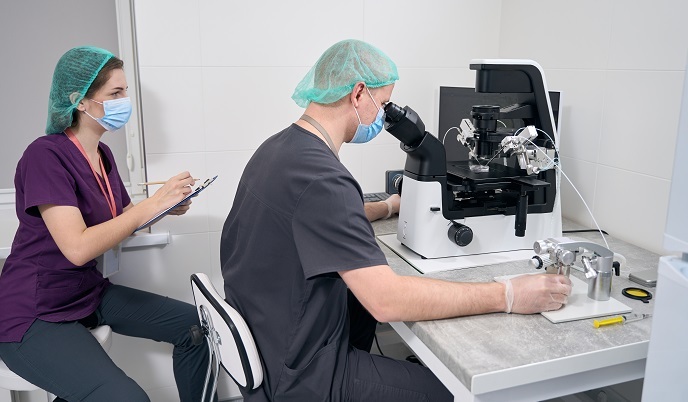
 Data Structure
Data Structure Networking
Networking RDBMS
RDBMS Operating System
Operating System Java
Java MS Excel
MS Excel iOS
iOS HTML
HTML CSS
CSS Android
Android Python
Python C Programming
C Programming C++
C++ C#
C# MongoDB
MongoDB MySQL
MySQL Javascript
Javascript PHP
PHPPhysics
Chemistry
Biology
Mathematics
English
Economics
Psychology
Social Studies
Fashion Studies
Legal Studies
- Selected Reading
- UPSC IAS Exams Notes
- Developer's Best Practices
- Questions and Answers
- Effective Resume Writing
- HR Interview Questions
- Computer Glossary
- Who is Who
What is the full form of IVF?
Introduction
In-vitro Fertilization (IVF) is a process where the egg is fertilised by the sperm outside the body of the organism. The sperm and the egg are then maintained in a nutrient fluid (special medium) and stored under controlled conditions in an incubator.

The process involves both medications and surgical processes, the fertilized egg is implanted in the uterus. There are three types of IVF treatments:
Natural cycle IVF
Mild stimulation IVF
In vitro maturation
Overview of IVF
In vitro fertilization technique is used as a primary treatment to overcome infertility and genetic problems like endometriosis, fallopian tube damage, ovulation disorders,fibroids in the uterus and decreased sperm production.
During the process the egg (ovum) and the sperm are fertilised in the lab and the embryo is placed inside the uterus to grow and develop.
This techniques is the most effective form of assisted reproductive technology which takes about 3 weeks to complete one full cycle of IVF. there are five steps involved in the procedure.
Procedure for IVF
IVF is an assisted reproductive technology where the egg and the sperm are fertilized in the lab and then implanted into the uterus for development. There are five steps in one IVF cycle which takes 3 weeks to complete. The steps are −
Intake of estrogen or birth control pills
The patient is given birtyh control pills to control the menstrual cycle and stop the development of ovarian cysts. This helps maximize the number of mature eggs during egg retrieval procedure
Ovary stimulation
In every individual during a healthy cycle, group of ovaries start to mature but only one matures and the others disintegrate. In IVF treatment hormones are injected in order for all the eggs in the group to mature. The shot which is called “trigger shot” is given 36 hours before the retrival of the eggs.
Removal of eggs or egg retrieval
Using an ultrasound as a guide with a help of needle attached to the suction the eggs are carefully removed from the follicle of the ovary. The collected eggs are placed in a petridish that contains the nutrient solution and is placed in the incubator. Medications are given to the patient to reduce the discomfort.
Fertilization
The sperms are collected and are fused using intracytoplasmic sperm injection (ICSI). The sperm is injected into the mature egg and the immature eggs are placed in the petridish and the sperms are placed in the dish in the attempt to fuse. Usually 70% of the eggs are fused and the the fertilized one becomes the embryo which is implanted in the uterus.
Embryo development and embryo transfer
The embryo is monitored carefully till the blastocyst stage - which is suitable to transfer into the uterus and the rest of the embryo are frozen for future transfer.
The embryo transfer is of two types; fresh embryo transfer and frozen embryo transfer. In fresh embryo transfer the embryos are implanted in the uterus within three days of egg retrival whereas the frozen embryos are stored and used during the time of transfer.
Hormonal injections are taken by the patient before the embryo transfer to prepare the uterus to accept the embryo. The medicatitions are given orally for 14 to 21 days and followed by six days of injections.
The embryo transfer is a simple process, a speculum is placed in the vagina and a catheter is sent throgh the cervix which has a syringe containing the embryos that are transferred into the uterus. Pregnancy occurs after the implantation of the embryo into the uterus which is tested after 14 days of embryo transfer.
Risks and complications of IVF
There are many risks associated with in vitro fertilization treatment
Side effects due to medications- medications used during the treatment can cause hot flushes,nausea,mood swings, abdominal bloating, vaginal bleeding, and headaches.
Ovarian hyperstimulation syndrome- its a rare syndrome that occurs in women who are sensitive to fertility medicine and it increases the production of eggs which leads to abdominal pain, weight gain, nausea, shortness of breadth, diarreah and urinary infection.
Ectopic pregnancy- this condition occurs when the fertilized egg gets implanted in the fllopian tube instead of the uterus. It causes stomach pain, vaginal bleeding and rupture of fallopian tube which is fatal.

Complications during egg retrieval- infection, blleding and damage to reproductive organs, bladder and bowel may occur.
Multiple pregnancies - if more than a single embryo is placed in the uterus there are chances of twins or triplets. This may cause premature birth and the babies born may we underweight.
Miscarriages- this complication is common among older women as the treatment becomes less effective with age and the child may have birth defects.
Other complications can be maternal haemorrhage, gestational diabetes, high blood pressure and delivery by C-section.
Success Rates and Future Possibilities of IVF
The success rate if IVF in women below 35 yrs of age is 50% and as age increases the success rate reduces. The possibility reduces with unhealthy lifestyle like smoking, drinking and obesity.
The future possibilities of IVF would include in optimizing the treatment protocols,better diagnosing tools to determine better egg and sperm quality and to determine the correct time for embryo transfer.
Conclusion
In vitro fertilisation is an assisted reproductive technology where the sperm and the egg are fertilized outside the body and the embryo are grown under special conditions and are transferred into the uterus.
FAQ’s
Q1. What is assisted reproductive technology?
Any fertility treatments that involves the handling of eggs and embryos is called Assited Reproductive Technology (ART). there are five types of ART’s
In vitro fertilization
Tubular embryo transport
Gamete intrafallopian transfer
Zygote intrafallopian transfer
Pronuclear stage tubal transfer
Q2. What are the medications used in IVF treatment?
The medications used during IVF treatment are mostly hormones like Follicle stimulating hormone (FSH), Human chorionic gonadotropin hormone(hCG) and leuprolide acetate.
Q3. What are the preparations required for IVF treatment?
The preparations that a−re required before IVF treatments are
IVF consultaion
Pap test and mammogram (over 40 yrs of age)
Semen analysis
Screening for sexually transmitted disease
Uterine cavity analysis
Genetic screening

